About G-Watch
The G-Watch network is present in 14 localities in nine regions of the Philippines. Twelve core groups of grassroots volunteers, civic leaders, and good governance champions in government have been built in the past decade. The network is coordinated and supported by the G-Watch Center. G-Watch also works with six CSO partners involved in social accountability and rights-based campaigns.
G-Watch provides an intellectual and civic bridge between the local, national, and global arenas to inform theory and practice in the participation and accountability field. For over two decades, it has developed monitoring processes covering public services and policies, and produced and promoted many publications. Through its pioneering initiatives, G-Watch models a strategic way of doing social accountability.
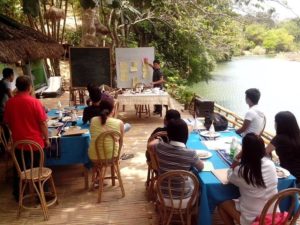
G-Watch leaders hold a planning workshop in Palawan. G-Watch regularly convenes leaders of core groups for collective analysis and agenda-setting (Credit: G-Watch).
Strategic Transparency, Participation, and Accountability
1. People Power: Sustaining Citizen Action and Accountability Frontliners
The Philippines is home to some of the best-known approaches and innovations on transparency, participation, and accountability. Yet, sustaining gains remains a challenge.
G-Watch monitors are ‘accountability frontliners‘: active citizens who secure and share important and accurate information on services, utilize accountability mechanisms, and generate government response. G-Watch learns with, from, and for accountability frontliners, asking how citizen action for accountability is sustained, what motivates accountability frontliners, and how movement-based approaches can be mainstreamed and strengthened in organizations working on accountability. Read more here.
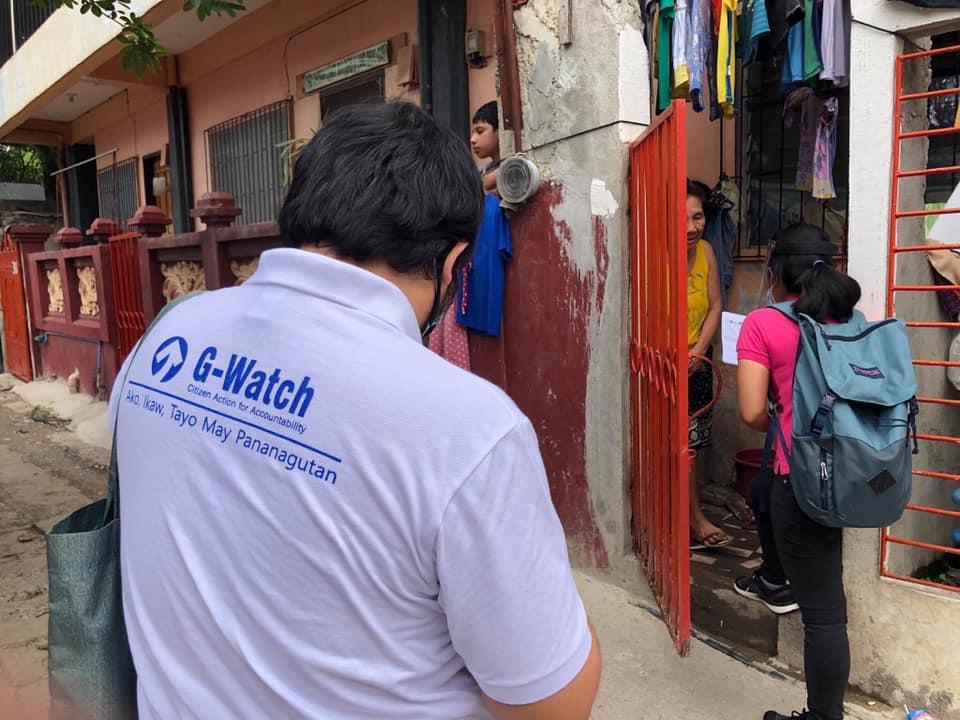 G-Watchers in Cebu check government COVID assistance. The Tagolog phrase “Ako, Ikaw, Tayo May Pananagutan” on the back of the G-Watcher’s shirt means “All of Us Have Accountability” (Credit: G-Watch).
G-Watchers in Cebu check government COVID assistance. The Tagolog phrase “Ako, Ikaw, Tayo May Pananagutan” on the back of the G-Watcher’s shirt means “All of Us Have Accountability” (Credit: G-Watch).
2. Promoting Rights Organizing for Health (PRO-Health)
PRO-Health aims to improve public health governance, ensuring high-quality, accessible reproductive, maternal and newborn, child, and adolescent health (RMNCAH) services. It engages three government initiatives for providing RMNCAH services: Reproductive Health and Responsible Parenthood; First 1000 Days; and the Mental Health Law.
G-Watch works towards these aims by: sharing the learning of its core groups; organizing and building networks and coalitions with partner CSOs and allied local government units; and facilitating citizen monitoring and advocacy.
PRO-Health operates in 12 localities:
- Dumaguete, Puerto Princesa, Lanao, and San Miguel–Bohol, with G-Watch core groups
- Pasig, with the Pasig City Local Government
- Naga, with Naga City People’s Council (NCPC)
- General Santos, Davao, and Cagayan de Oro, with the Student Council Alliance of the Philippines (SCAP)
- Tacloban, Cebu, and Samar, with the Samahan ng Nagkakaisang Pamilya ng Pantawid (SNPP).
PRO-Health monitoring uses a set of tools to monitor facilities, services, and medicines in local government (Barangay) health units; procurement activities; and performance of public health professionals. It builds on G-Watch’s knowledge and experience of vertical integration, a strategic approach to accountability that synergizes citizen actions at different levels of decision-making.
Alongside monitoring and advocacy, PRO-Health does action research on building effective networks and coalitions for health rights advocacy. Learn more here.
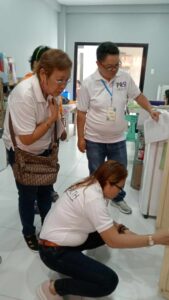 Volunteer monitors from G-Watch Dumaguete participating in PRO-Health inspect the facilities and medicines of a Barangay health station in Dumaguete City (Credit: G-Watch).
Volunteer monitors from G-Watch Dumaguete participating in PRO-Health inspect the facilities and medicines of a Barangay health station in Dumaguete City (Credit: G-Watch).
3. Scaling Accountability through Vertically-Integrated Youth-Led Engagement
G-Watch has been exploring youth-led accountability engagement as a way of addressing the question of scale and sustained impact. Can youth organizing enable accountability at a broad scale, with sustainable impact? How can the scaling up of youth organizing nurture collective action to improve governance? How can civil society initiatives that result in powershifts be scaled up?
With the Center for Youth Advocacy and Networking (CYAN) and the Student Council Alliance of the Philippines (SCAP), G-Watch is implementing an education monitoring project, Multiply-Ed. Funded by the Global Partnership for Education under its Education Out Loud program, Multiply-Ed aims to improve transparency, participation, and accountability in education governance through a youth-led, multi-sectoral, and multi-level approach to monitoring government education policy and service delivery. In particular, it focuses on learning continuity plans for Senior High Schools and the post-Covid transition to face-to-face classes. Learn more here.
4. Action Research on Multi-Level Monitoring of Social Programs
Since 2017, G-Watch has been engaging several pro-poor participatory government reform programs at different levels of decision-making to understand how and whether their citizen engagement and accountability features work. This has involved exploring the application of multi-level civil society monitoring in enhancing accountability. G-Watch continues to engage and examine social programs including the government’s principal conditional cash transfer program (Pantawid Pamilyang Pilipino Program, 4Ps); a social protection program using a community-driven development approach (Kapit Bisig Laban sa Kahirapan, KALAHI); and participatory budgeting. During Covid-19, G-Watch adapted multi-level monitoring and citizen action to focus on health and social assistance.
5. Strategic Accountability in Peace-Building: the Bangsamoro Engagement
G-Watch has long been present in the autonomous region of Muslim Mindanao, conducting monitoring, facilitating good governance dialogues, and helping build peace alliances. Since the passage of the Bangsamoro Basic Law that created the Bangsamoro Autonomous Region of Muslim Mindanao (BARMM), G-Watch has further explored the role of strategic accountability in post-conflict peace-building, especially by collaborating with BARMM-based grassroots partners and allies.
This work aims to explore whether and how strategic accountability can be enabled in BARMM. In 2020, G-Watch and partners proposed a plan for a comprehensive accountability system called the BARMM Monitor. G-Watch worked with BARMM-based leaders to track the progress of transparency, participation and accountability during the Covid-19 pandemic. It has since established a local core group of accountability frontliners in Lanao who are involved in Multiply-Ed and PRO-Health, and who are building alliances in the BARMM parliament.
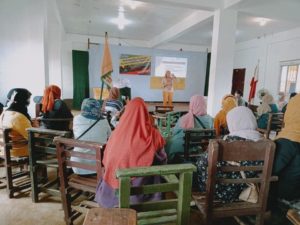
G-Watch in Lanao convenes a discussion on elections as an accountability platform (Credit: G-Watch).
6. Learning to be Strategic: TPA Now!
The challenge of achieving an impact that addresses the root causes of social problems through transparency, participation, and accountability (TPA) initiatives points to the need for a different way of doing accountability. To advance the discourse and practice of ‘strategic TPA,’ in 2020 G-Watch launched a paper series, TPA Now! It provides a platform for practitioners, researchers, and action strategists to present evidence and reflect on strategic TPA and to broaden awareness of the importance of accountability in governance. For all TPA Now! Papers visit www.g-watch.org
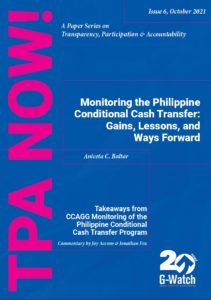
Resources
Browse all G-Watch news stories, resource documents, and publications on the G-Watch website.
Dissonance Spotting: Multi-level Engagement of G-Watch Accountability Frontliners and the Contrasting State of Philippine Governance during COVID (Joy Aceron 2023)
‘Constructive Accountability’: Sandwich Strategy for Textbook Delivery in the Philippines (Joy Aceron 2022)
Enabling Powershifts: KALAHI in the Philippines (Joy Aceron 2022)
Monitoring the Philippine Conditional Cash Transfer: Gains, Lessons, and Ways Forward (Aniceta Baltar 2021)
‘Accountability Frontliners’: Citizen Monitors are on the Frontlines of the Pandemic Too (Joy Aceron 2021)
Vertical Integration: Localizing the Concept (Francis Isaac and Joy Aceron 2021)
Pananagutan: Accountability and the Struggle for Filipino Nationhood (Francis Isaac 2021)
Action Research Collaboration on Multi-Level Accountability Politics: The ‘Different’ that Makes a Difference (Joy Aceron 2021)
Bibingka Strategy: A Conceptual Summary (Francis Isaac and Joy Aceron 2021)
Rebooting Accountability: An Introduction to the TPA Now! Paper Series (Francis Isaac 2020)
Pitfalls of Aiming to Empower the Bottom from the Top: The Case of Philippine Participatory Budgeting (Joy Aceron 2019)
Francis Isaac on Multi Level Accountability Politics in Land Reforms in the Philippines (video 2018)
Going Vertical: Citizen-led Reform Campaigns in the Philippines (Joy Aceron, editor 2018)
From the Ground Up: Multi-Level Accountability Politics in Land Reform in the Philippines (Francis Isaac, Danilo Carranza, Joy Aceron 2017)
Construyendo la rendición de cuentas de manera diferente: Una propuesta para la integración vertical del monitoreo y la incidencia pública (Jonathan Fox, Joy Aceron, and Aránzazu Guillán Montero 2017)
Going Vertical: Citizen-led Reform Campaigns in the Philippines (Joy Aceron and Francis Isaac 2016)
Doing Accountability Differently. A Proposal for the Vertical Integration of Civil Society Monitoring and Advocacy (Jonathan Fox, Joy Aceron, Aránzazu Guillán Montero 2016)
